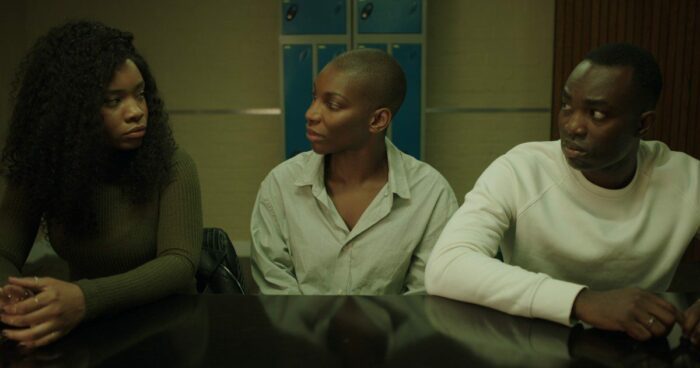Before I had watched Michaela Coel’s I May Destroy You, I had been told to expect something special. I knew the series was focused on sexual assault, but I wasn’t prepared for what I watched.
Written by Michaela Coel, known for Chewing Gum, I May Destroy You is a story about main character Arabella’s sexual assault. Coel also stars as Arabella. Since its release in June 2020, the show has gone on to win and be nominated for dozens of awards. Coel won an Emmy earlier this year for writing the show, and in her acceptance speech dedicated the story to survivors of sexual assault.
Arabella’s story is told in 12 episodes. She is a girl who has been assaulted in a bar, and is now suffering the deep-seated consequences of the attack. The story follows her as she pieces together what has happened to her and considers the emotional fallout of the experience. We are also given insight into the lives of her peers, some of whom are also in sexually exploitative situations. The show also touches upon stealthing, police disinterest, and the importance of support networks.
We first meet Arabella as a young writer enjoying her life. She is spending time with her friends, has just been on holiday in Italy, and seems to be enjoying her job. She has an important deadline coming up, but seems to be behind with her draft. Nevertheless, she seems happy, carefree, and broadly as though her life is going well.
Everything changes after a night out. She stumbles into work early in the morning after going out seeming disorientated and hungover, but there is not yet any indication that anything is really wrong. However, as time progresses, she begins to question the friends she was out with—asking questions about the night and about how the night ended. She seems concerned and uncomfortable, and has damage to her phone that she can’t remember happening. She is already having flashbacks of things that happened during the night.

Soon after she starts to experience flashbacks of an attack that happened to her in the bathroom of the venue she had visited with her friends. The experience comes back to her in fragments, but she does not immediately piece them together into an understanding of what happened. Triggered by things in her everyday life, such as opening her door, the flashbacks and intense and Arabella is disturbed. It is well-documented that this kind of flashback is very typical in sexual assault victims, but I have never seen the experience displayed quite so authentically on-screen.
Arabella continues to show up to work, and, unlike other shows that often romanticise the support and care show by others before the assault is even disclosed, I May Destroy You really gives us an insight into how alone and isolated survivors can feel. Arabella’s employers completely miss the signs that something is seriously wrong, despite her showing up to work with a cut on her forehead, and instead start to push her and ask why her work is taking so long. This, too, is an intensely honest display of how somebody might be treated before disclosing their assault. There is no romanticism in the reaction of those around her—nobody is insisting there is something wrong or that she is behaving out of character. They simply assume she is lazy or difficult. This is heart-breaking, but is so good to see represented.
The other way in which this show was exceptionally written lies in its details and commitment to the authentic portrayal of women’s lives. In so many scenes I found myself taken aback by the candid narrative. Examples of this include Arabella finding a blood clot when trying to have sex whilst on her period and having to explain to her hookup that this is normal, and her inability to focus on anything she wants to do and this being taken at face value and regarded as an inadequacy.
The discovery process that Arabella went through was also non-linear; she experienced flashbacks and confusion, and for much of the time she was unclear about her assault. It took her time to register it as such, and even more time to recall details and specifics about the perpetrator. We watch her as she discovers hidden memories and realizes the true extent of the damage that’s been done to her. We are also privy to the intense anger she starts to experience as she makes these connections.
Through Arabella, we are seeing that the consequences of rape are varied, individual, devastating, and complicated.
Accompanied by Terry (Weruche Opia), her friend, Arabella decides she wants to find and confront her attacker. Before they find him, she goes through mentally all the possible ways in which she could confront him. Many of these daydreams are violent and revenge focused. No part of her emotional reaction is hidden from us. Throughout Episode 12 ‘Ego Death’, we are presented with all the possible scenarios that run through Arabella’s head. We watch her catharsis and the mental work she puts in to reach her own peace with what happened to her. It is a very powerful portrayal of thoughts that are usually left unspoken and unshared.
This series excellently highlighted the fallout of sexual assault, and also emphasized that sexual assault does not fit one mould.

There is also an example of a male victim, one of Arabella’s peers. His story is handled very delicately. It is not over-done, and reminds us that sexual assault is not an exclusively female issue. In the fourth episode, Kwame (Paapa Essiedu), a friend of Arabella’s, goes to meet a man he has met on a dating app. When with him, after spending some time with another man who has now left, he decides that he doesn’t want to take things any further and expresses that he’d also like to leave.
However, his ‘date’ does not let him leave. He slams the bedroom door on Kwame’s hand, and grips him tightly and presses him into his bed. He lies on top of him and grinds against him until he finishes, while Kwame protests. Kwame runs out of the room as soon as he is able to, and later we see him googling whether his experience was a rape.
This showed us that, while it is common to not realise a sexual assault has happened right away, it can also be very obvious. But, despite this, even when a victim knows they have been violated, labelling this violation as rape can be very confusing and complicated. Many sexual assaults are not clear-cut, and Kwame’s confusion presents this clearly. He was assaulted, but the lack of penetration leads him to wonder if he can really call his experience rape, and no doubt the greyness of the encounter also makes it much more difficult for him to find the words to speak out.

This sub-plot really meant something to me—too often it is assumed that sexual assaults cross clear, obvious boundaries. The truth is often much murkier. There is also a lack of representation and conversation about black male sexual assault. I May Destroy You challenges this, and reminds us that just because an assault is difficult to classify or the abuse is prevalent, the effects are not any less horrific or damaging. Kwame’s storyline reminds us that sexual assault should never be trivialised, no matter who the victim is.
In the UK, one in twenty women have been raped and 97% have been sexually harassed. In the US, 1 in 6 women are raped each year, as well as 1 in 33 men. Everybody knows somebody who has been sexually assaulted, and yet there are very few on-screen stories showing this within normal, authentic lives. Most shows about rape are extreme or specific—either documentaries about outlier cases or are shows like The Handmaid’s Tale that are specifically about a sex slavery dystopia. The realism punctuating this show is what makes it so special. Coel presented rape as an experience within an ordinary life, honestly and relatably. This felt new, refreshing, and important.
Arabella’s story teaches important lessons for all young people, and this show—while not necessarily suitable for children—educates its audience about sexual assault and its many guises. Michaela Coel has flung the door wide open on a discussion that has been long overdue, and did so with true authenticity. Her story included the confusion, disbelief, and denial that victims can face; it did not leave out male victims, nor did it gloss over the casual abuse that can be found in schools. I May Destroy You is an beautiful exhibition of truth, power, and reality.
If this series passed you by, it’s worth going back to. You can watch I May Destroy You on BBC iPlayer in the UK, and HBO Max in the US.

